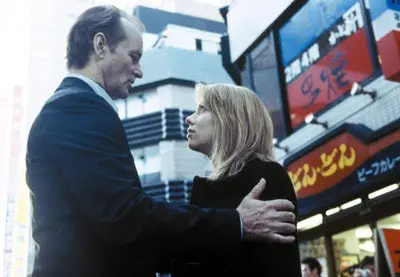I'm sure I've seen Lost in Translation before today. Lost in Translation is a film starring Bill Murray and Scarlett Johansson. It's about two people who aren't very happy, and then are subjected to culture shock to make it worse. Through their culture shock and depression they meet each other. And bring each other out of it.
I could've sworn I've seen it before, but despite taking place in Japan and starring Bill Murray, it didn't make an impression on me. Though in October 2003, I was in a different place. Happy and in love. Lost in Translation's heavy tones fell on my deaf ears.

When I find myself alone in Japan, there is always that looming sense of isolation. I can ask questions and receive answers, but there is no one I can really engage in conversation. All I have are my thoughts to bounce ideas off of. I text, email or IM people back home, but the sound of my own voice becomes mute. It becomes a treasure when I actually have another American (like myself) to talk to. I thought Scarlett Johansson nailed that emotion perfectly when the film followed her around for a day.
Those scenes really are the perfect picture of a lone foreigner wandering about the daily lives of a population that is not their own. For the most part, everyone just ignores the outsider. Everyone is plugged into their lives, and have no business getting into others. Children will sometimes break those boundaries, but that's only because they haven't been incorporated into society, yet.
Though, I've never experienced the agoraphobic culture shock to the point of incapacitation. The only times it has taken anchor has been when I've truly been alone in Japan. But, I just throw those emotions away. My time in Japan has always been short and limited. It would be a waste to be stuck in a tiny hotel room.

Obviously, I identify far more with Scarlett Johansson's character's silent brooding wonderment, than Bill Murray's case. Though when I'm in Japan, it's for absolutely no purpose than to wander around and look at things. If I were there on business, as is Bill Murray's character, my culture shock probably wouldn't be as agoraphobic. His culture shock is in the language and miss-communication. I don't have much trouble in that department.
The scene where Bill Murray is waiting in the hospital talking with the granny is a conversation I've had many times in Japan. ^_^ Japanese people will always try to dumb down their language to what they think is simple for you, but is often what makes them even more difficult to understand. I know sentence structure, noun forms, and what is being said, I just can't translate some of the words because my vocabulary is horrible. Maybe I just need to ask, "What is this word?"
Though, a lot of the Japanese dialogue in the film is pretty easy to understand.

Lost in Translation ends in the same manor many moments end in Japan. A moment is that is truly final. A moment that can only take place in a single moment of your life and one that can never be relived. A "Goodbye" that is goodbye forever.
Charolette and Bob Harris depart under these terms and embrace with the knowledge they will never see each other again. Because time in Japan always comes with an expiration date. And when it expires, that is it. The end. And that is where the film ends.

In real life, most of these moments are final, but that is not the end of the story. The epilogue is returning to life before Japan. Taken away from isolation and plugged back in familiarity and understanding. For some people this is a breath of fresh air. People to finally talk to! People who understand me! For me, I cherish the isolation.
Nothing bothers me in Japan. People keep to themselves and are polite to each other. Store clerks say thank you and go out of their way to ensure your satisfaction. Being a foreigner, I'm a guest in their country and they treat me as such.
Back in America, Life sucks. Everyone is unhappy because they HAVE to work today. A single customer asking a single request is WAY TOO GODDAMN much of a hassle. People think too much of themselves rather than the company they represent. They think of the company paying them for their services, rather than them earning their pay for giving their services.
Everything in life returns to the ordinary, rather than the extraordinary. Here's what I thought when I first got back after those 3.5 months studying abroad: December 29th, 2006.
Showing this side of being in Japan would have truly ruined Lost in Translation.
Anyways, Lost in Translation fell on deaf ears because I didn't know anything about this. I never had these moments. I never experienced such isolation. I never had to talk through a language barrier. All these points resonate beautifully in the film. So much so that I can never watch it again. Unless it's with my friends from the Fall 2006 Class of Nagasaki Gaigokugo Daigaku.